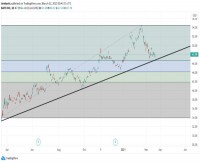|
Opalesque Industry Update - Activist hedge funds often push the management teams they target to pursue a sale of the company, which is the only reliable strategy for generating a return for themselves and the shareholders of the companies they target, according to “Activism Mergers,” a new study released by the University of North Carolina Kenan-Flagler Business School. The study was conducted by UNC Kenan-Flagler finance professors Anil Shivdasani and Nickolay Gantchev and Nicole Boyson of the D’Amore-McKim School of Business at Northeastern University, and will be published in the Journal of Financial Economics. It represents some of the most comprehensive analysis on the topic to date, analyzing more than 2,000 hedge fund activist campaigns and more than 3,200 M&A transactions during the past 15 years. Probability of takeover bids increases The researchers found that the launch of a hedge fund activist campaign makes a company three to six times more likely to receive a takeover bid during the following two years than a company not targeted by such a campaign. Even when hedge fund activists switch from a passive holding to an activist strategy, there is a three-fold higher likelihood of a takeover bid. Acquisition premium increase When the target is embroiled in an activist campaign, takeover bids are attractive propositions for shareholders, with acquisition premiums that are more than 10 percent higher than in typical mergers. These takeover bids experience a completion rate of 96 percent, 3 percent higher than typical M&A deals. Stock price performance tied to acquisitions Hedge fund activism campaigns where the target company is acquired result in sizeable stock-price outperformance, with an average shareholder return of 37 percent over two years, adjusting for market-wide performance and company risk. In contrast, activism campaigns that do not result in a takeover offer lead to a negligible average shareholder return of only 0.6 percent. “These findings highlight the reality that despite often pushing for operational changes at the companies they target, hedge fund activists are ultimately only successful in generating value when they can attract and facilitate a takeover offer for the company,” Shivdasani said. “Even when a takeover offer is not completed, shareholders end up earning outsized returns because the combined pressure of the activist campaign and a takeover bid typically pushes companies to make drastic changes to their operational and financial plans.” The study found hedge fund activist targets that received a takeover offer that was eventually unsuccessful experienced average shareholder returns of 17.7 percent. Impact of activists as bidders Regardless of the potential for increased shareholder value, the study’s findings indicate that investors should be cautious about certain activism-driven M&A deals. When the activist hedge fund is also the bidder for the company, company shareholders do not fare as well. These bids feature premiums that are, on average, 23 percent lower, and end up being unsuccessful in nearly 50 percent of the cases. “These findings show that to create value for targeted companies, the activist hedge fund must have incentives that are well-aligned with shareholders of the targeted companies rather than those of the buyer,” said Shivdasani. |
Industry Updates
New UNC research finds activist hedge funds deliver returns only during takeovers
Wednesday, November 02, 2016
|
|





 RSS
RSS







